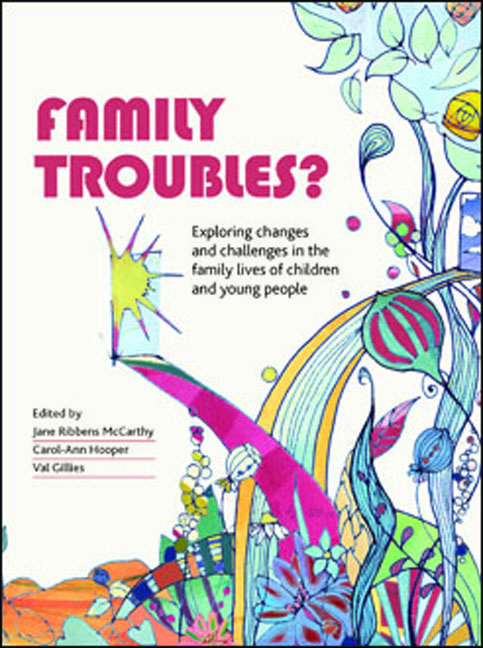Book contents
- Frontmatter
- Contents
- Notes on contributors
- Foreword
- Preface
- 1 Troubling normalities and normal family troubles: diversities, experiences and tensions
- Part One Approaching family troubles ? Contexts and methodologies :Introduction to Part One
- Part Two Whose trouble ? Conteste d definitions and practice: Introduction to Part Two
- Part Three The Normal, The Troubling And The Harmful?: Introduction to Part Three
- Part Four Troubles and transitions across space and culture: Introduction to Part Four
- Part Five Working With Families: Introduction to Part Five
- Index
8 - Troubled talk and talk about troubles: moral cultures of infant feeding in professional, policy and parenting discourses
Published online by Cambridge University Press: 07 September 2022
- Frontmatter
- Contents
- Notes on contributors
- Foreword
- Preface
- 1 Troubling normalities and normal family troubles: diversities, experiences and tensions
- Part One Approaching family troubles ? Contexts and methodologies :Introduction to Part One
- Part Two Whose trouble ? Conteste d definitions and practice: Introduction to Part Two
- Part Three The Normal, The Troubling And The Harmful?: Introduction to Part Three
- Part Four Troubles and transitions across space and culture: Introduction to Part Four
- Part Five Working With Families: Introduction to Part Five
- Index
Summary
Introduction
This chapter examines the ways in which policy agendas and contemporary notions of the ‘good mother’ frame infant feeding practices, rendering them a site of moral and interactional trouble. Drawing on analysis of mothers’ talk with midwives during the first days of motherhood, the chapter explores the ways in which breastfeeding confers a positive maternal identity, while choosing not to do so is associated with a deficit identity against which mothers struggle to present themselves as good parents. The chapter suggests that mothers’ interactions with professionals are important places for exploring the ways in which ‘ordinary’ family practices may be troubled by professional and policy agendas that may conflict with women's embodied experiences and cultural beliefs about what constitutes a healthy, well-fed baby. A focus on these encounters makes visible the rich texture of maternal labour and its complex and troubling relationship with policy.
Infant feeding: a troubled policy terrain?
Despite widely reported health benefits and a national and international policy agenda to increase the uptake and duration of breastfeeding, the UK has one of the lowest breastfeeding rates in the developed world (WHO, 2003; Bolling et al, 2007; DH, 2007; ONS, 2007). While both the Department of Health and the World Health Organization recommend that mothers breastfeed exclusively for the first six months, most do not, and by six months of age, only 2% of infants are wholly breastfed and 75% receive no breast milk at all (Bolling et al, 2007; ONS, 2007; Hoddinott et al, 2008). However, while formula-feeding might be considered ‘normal’ in statistical terms, survey and interview-based research suggests that, for many, it is experienced as ‘non-normative’ and troubling. While the majority of mothers report their intentions to breastfeed, a significant number express regret at stopping breastfeeding earlier than they had anticipated and feel stigmatised for their decisions not to breastfeed or to stop breastfeeding (Dykes, 2005; Hoddinott et al, 2008), indicating a troubling gap between mothers’ expectations and experiences.
A useful perspective on this issue is offered by Lee's suggestion that mothers’ breastfeeding troubles are symptomatic of a wider political agenda and the intensification of parenting, such that matters that were once the private concerns of families are increasingly contested and problematised (Knaak, 2005; Lee and Bristow, 2009; Lee et al, 2010).
- Type
- Chapter
- Information
- Family Troubles?Exploring Changes and Challenges in the Family Lives of Children and Young People, pp. 97 - 106Publisher: Bristol University PressPrint publication year: 2013
- 1
- Cited by

